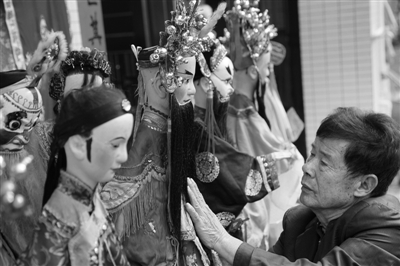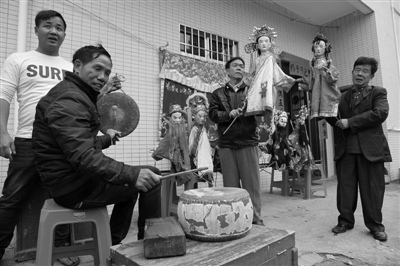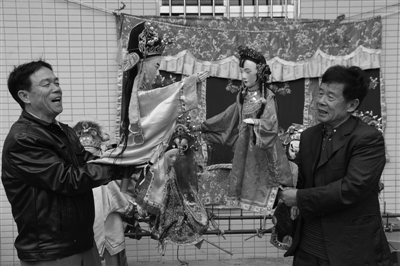Home> Arts and Traditions
The three puppeteers of Zhanjiang
For over four decades, the people of Potou village in Zhanjiang have been entertained by a trio of brothers who have dedicated their lives to bringing history to life through their unique puppet shows.
Luo Guanlai, 73, Luo Tianfu, 66, and Luo Shicheng, 64, are master puppeteers who have made their careers from behind and above the stage. Though their puppets take the spotlight each night, the brothers are the real heroes.
Guanlai, the eldest brother, became a puppeteer's apprentice during the 1960s, learning the skills of song, speech, puppet control, and combat, the basic traits for performing puppet shows in the Peking Opera style.
 |
|
Luo Guanlai, the eldest brother, maintains his puppets. [Photo/Zhanjiang Evenings] |
After a few years, Guanlai's brothers, Tianfu and Shicheng, joined him to study the craft, with Shicheng focusing mainly on producing music for performances.
Together, the trio, taught by their master Chen, became skilled at manipulating puppets to perfection and performing various plays from the Chinese opera canon.
Speaking of their time learning under master Chen, the brothers say that their training was anything but what students today would expect.
"We didn't have any guidebooks. We learned everything just by using our eyes and ears," says Guanlai.
 |
| Luo Shicheng (L2) plays the drum for his older brothers. [Photo/Zhanjiang Evenings] |
Upon learning all they could from master Chen, the brothers embarked on a career in entertainment that has spanned decades and almost two generations. Their signature use of libretto singing in Potou dialect, combined with exquisite drums and gongs as well as complex puppet manipulation and dancing, have made them a popular item on the local bill ever since.
Costing upwards of 500 yuan ($72.6), each puppet requires constant maintenance and waxing so that they remain fit for their acrobatic performances.
There is an old Chinese saying that goes "a minute on the stage takes 10 years' of practice", and it is true, according to Guanlai.
"When performing, we have to lift the puppets with a stick, each puppet alone weighs about 1.5 kilograms and shows of two or three hours can be extremely exhausting."
 |
|
Luo Guanlai (R) and Luo Tianfu (L) perform with their puppets. [Photo/Zhanjiang Evenings] |
Using a collection of well-thumbed history book as their inspiration, the brothers have managed to introduce new stories and performances to the art form.
"We don't use ready-made scripts so we adapt our works from ancient novels mainly themed on wars," says Tianfu."We spent most of our time during the day working on the farm and at night we write the scripts."
Despite many traditional art forms waning in popularity in recent years, the trio has succeeded in attracting several young and middle-aged villagers to take up the study of puppetry.
Guanlai's own son, Luo Hanzhong, born in the 1980s, is following in his father's footsteps and picking up his own puppets, and even helping out at some of their shows. In the lead up to Spring Festival, the trio has been performing for the past two months in the old streets of Chikan district in Zhanjiang. Having made a name for themselves outside of their village, the brothers have performed many shows during Spring Festival, packing venues in villages and districts all around the city.
Puppetry is said to have been first introduced in China during the Han Dynasty (206 BC–AD 220), finally making its way to Guangdong province during the Yuan Dynasty (AD 1279–1368). With a repertoire of puppetry styles popular all over the province, Zhanjiang puppetry is valued for its high artistic value, and was included on the provincial intangible cultural heritage list in 2013.

 Print
Print Mail
Mail 5G construction supports Zhanjiang's high-quality development
5G construction supports Zhanjiang's high-quality development
 Acting mayor inspects project construction in Xuwen, Leizhou
Acting mayor inspects project construction in Xuwen, Leizhou Zhanjiang island an "egret paradise"
Zhanjiang island an "egret paradise"  Dancing egrets add vitality to Xiashan
Dancing egrets add vitality to Xiashan